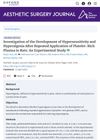22 citations,
May 2016 in “Breast cancer research and treatment” Some patients using cold caps to prevent hair loss from chemotherapy got mild scalp injuries similar to frostbite.
 18 citations,
June 2019 in “Clinical research in dermatology”
18 citations,
June 2019 in “Clinical research in dermatology” Acne can't be cured but can be managed with treatments like benzoyl peroxide and diet changes; it's costly and can lead to scarring and mental health issues.
15 citations,
November 2018 in “Current radiopharmaceuticals” Melatonin can help prevent and treat skin damage caused by gamma rays.
 14 citations,
May 2019 in “Journal of Maxillofacial and Oral Surgery”
14 citations,
May 2019 in “Journal of Maxillofacial and Oral Surgery” FUE hair transplant is a promising method with benefits like less scarring, but requires a skilled surgeon and can damage hair follicles.
12 citations,
January 2021 in “Journal of Cutaneous and Aesthetic Surgery” Epidermal growth factor helps skin and hair regeneration but needs more research for better understanding.
 11 citations,
August 2023 in “Burns”
11 citations,
August 2023 in “Burns” Nerve growth factor helps improve healing time and scar quality in burn wounds.
 9 citations,
March 2023 in “Biomimetics”
9 citations,
March 2023 in “Biomimetics” New materials that better mimic natural skin structure could improve healing, especially for chronic wounds.
 9 citations,
January 2017 in “International Journal of Trichology”
9 citations,
January 2017 in “International Journal of Trichology” The study suggests that mast cells might be involved in the hair loss condition telogen effluvium and could be a target for treatment.
 8 citations,
June 2022 in “International Journal of Molecular Sciences”
8 citations,
June 2022 in “International Journal of Molecular Sciences” Tiny particles called extracellular vesicles show promise for skin improvement and anti-aging in facial care but face challenges like low production and lack of research.
8 citations,
July 2021 in “F1000Research” Plant-based compounds might be a promising alternative for prostate cancer treatment with fewer side effects.
 7 citations,
April 2019 in “Aesthetic Surgery Journal”
7 citations,
April 2019 in “Aesthetic Surgery Journal” Repeated use of platelet-rich plasma in rats caused increased pain sensitivity.
6 citations,
January 2023 in “Evidence-based Complementary and Alternative Medicine” Combining yoga and certain herbs can effectively manage PCOS symptoms and improve quality of life.
 6 citations,
December 2022 in “Frontiers in Pharmacology”
6 citations,
December 2022 in “Frontiers in Pharmacology” Quercetin may help improve symptoms of polycystic ovary syndrome.
5 citations,
December 2023 in “Materials” Organic and biogenic nanocarriers can improve drug delivery but face challenges like consistency and safety.
5 citations,
April 2023 in “Pharmaceuticals” The new delivery system improved hair growth in alopecia treatment.
 5 citations,
September 2022 in “Antioxidants”
5 citations,
September 2022 in “Antioxidants” A substance from Caulerpa racemosa seaweed may protect against skin damage caused by air pollution by reducing oxidative stress and cell death.
 4 citations,
December 2022 in “Frontiers in Bioengineering and Biotechnology”
4 citations,
December 2022 in “Frontiers in Bioengineering and Biotechnology” Exosomes show promise for improving wound healing, reducing aging signs, preventing hair loss, and lightening skin but require more research and better production methods.
4 citations,
December 2022 in “Al-mağallaẗ al-ʻirāqiyyaẗ li-l-ʻulūm al-bayṭariyyaẗ/Iraqi journal of veterinary sciences” Tioconazole cream is highly effective and easy to use for treating sheep dermatophytosis.
 3 citations,
December 2023 in “Cell proliferation”
3 citations,
December 2023 in “Cell proliferation” Stuff from umbilical cord stem cells helps skin heal and look younger.
 3 citations,
December 2022 in “Cells”
3 citations,
December 2022 in “Cells” Cannabinoids like CBD and THC may help treat non-cancer skin diseases, but more research is needed.
 3 citations,
January 2020 in “PubMed”
3 citations,
January 2020 in “PubMed” Adding insulin-like growth factor 1 and bone marrow-derived stem cells to a collagen-chitosan scaffold helps wounds heal faster and regrows hair follicles.
 2 citations,
June 2023 in “Pharmaceutics”
2 citations,
June 2023 in “Pharmaceutics” Nanofiber scaffolds help wounds heal by delivering drugs directly to the injury site.
 2 citations,
May 2023 in “Frontiers in Bioengineering and Biotechnology”
2 citations,
May 2023 in “Frontiers in Bioengineering and Biotechnology” The document concludes that more research is needed on making and understanding biomaterial scaffolds for wound healing.
2 citations,
May 2023 in “Frontiers in Pharmacology” Natural products may help treat skin inflammation from abnormal adrenal hormones.
 2 citations,
September 2022 in “Cytotherapy”
2 citations,
September 2022 in “Cytotherapy” Fat-derived stem cells show promise for treating skin issues and improving wound healing, but more research is needed to confirm the best way to use them.
2 citations,
June 2022 in “Phytomedicine” Shi-Bi-Man helps hair regrowth by activating the FGF pathway in cells.
2 citations,
February 2021 in “Case reports in dermatological medicine” The new topical botanical formulation significantly regrew hair in all five patients without side effects.
 1 citations,
January 2024 in “Cellular & Molecular Biology Letters”
1 citations,
January 2024 in “Cellular & Molecular Biology Letters” Adipose-derived stem cells help heal burns but need more research.
 1 citations,
November 2023 in “Journal of ovarian research”
1 citations,
November 2023 in “Journal of ovarian research” Agaricus subrufescens improves ovarian function and biochemical health in rats with PCOS.
 1 citations,
November 2023 in “Biomaterials advances”
1 citations,
November 2023 in “Biomaterials advances” Sponges made of soy protein and β-chitin with human cells from hair or fat can speed up healing of chronic wounds.


















